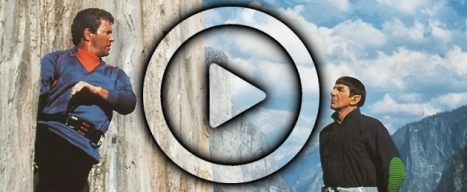This July and August, we’re celebrating the release of Star Trek Beyond by taking a look back at the third season of the original Star Trek. Check back every Monday, Wednesday and Friday for the latest update.
It is almost as though the Star Trek franchise doesn’t want to end.
For a fifty-year-old franchise, Star Trek has a hilarious near-miss ratio when it comes to offering satisfying conclusions. There are exceptions, of course. The franchise seems quite good at closing smaller chapters while the rest of the property rattles on. Star Trek VI: The Undiscovered Country was the best place to leave the cast of the original show. The final season of Star Trek: Deep Space Nine might have been rocky, but What You Leave Behind bid an emotional farewell to the cast and crew. Beyond that? The franchise struggles.

A cold reception.
It often seems like the ideal closing instalment is buried one or two stories shy of the actual ending. All Good Things… would have been a great place to leave the cast of Star Trek: The Next Generation, particularly since Star Trek: Nemesis wound up being such a damp squib of a conclusion. Demons and Terra Prime provided a satisfying conclusion to the final two years of Star Trek: Enterprise, only for These Are the Voyages… to air as the final episode of the franchise for well over a decade.
This is something that the franchise inherited from the original show. Star Trek was remarkably terrible at choosing a high (or even an appropriate) note on which to end. Although some of this can be down to the fact that sixties television seasons did not build to a finale in the way that modern television does, the three seasons of Star Trek all end in disappointing fashions. The City on the Edge of Forever would have been a great close to a first season that built incredible momentum across its run. Instead, the year ended on Operation — Annihilate!

Snow escape.
This was a bigger issue during the second season, when it was entirely possible that Star Trek would be cancelled. Ending on a strong note was imperative. Instead, Gene Roddenberry chose to give over the last broadcast and production slot of the season to Assignment: Earth, a thinly-disguised (and ultimately underwhelming) pilot for a series that never got off the ground. Even in terms of production, the penultimate episode of the season was Roddenberry’s vile passion project, The Omega Glory. (The Ultimate Computer would have made a much better ending.)
So it is with the third season. The last episode of the third season is an infamous disaster, Turnabout Intruder ranking as one of the very worst episodes of Star Trek ever produced. Even the misguided and mean-spirited cynicism of These Are the Voyages… has nothing on the rank sexism of Turnabout Intruder. It was an ignominious episode upon which to draw down the curtain, to wrap up three years and seventy-nine episodes of storytelling. It is hard to tell whether the episode is more or less awful than The Omega Glory or Assignment: Earth, but it is in contention.

Dying free(ze)…
This is all the more frustrating because a perfectly good alternative rests right along side it. All Our Yesterdays is a flawed and imperfect episode in some key ways, like many of the third season episodes around it. It is a story that flows on dream logic rather than rational plotting, relying on a bizarre fairy tale version of time travel and falling back on some of Fred Freiberger’s best-loved tropes. It is also a tough sell as a “final” episode, given that the series had not been cancelled by the point that the episode entered production, and it does not offer too much in the way of closure.
And yet. All Our Yesterdays feels like the culmination of the morose themes that have been building through the third season, all the dead worlds and the ghost stories and the doomed romances. It is a story about escaping to the past when there seems to be no future. It is populated by barren wastelands and death sentences, about the literal end of the world and survival beyond that point. It is a quiet and withdrawn affair, morbid and reflective more than heightened or action driven. It is a story about death, which feels entirely appropriate at this interval.

How BiZara…
Continue reading →
Filed under: The Original Series | Tagged: all our yesterdays, spock, star trek, the city on the edge of forever, time travel | 20 Comments »

































